Northern Ireland’s political leaders know the right thing to do to solve the Stormont stalemate – and need to “get on and do it”, former prime minister Sir Tony Blair has said.
Sir Tony was appearing alongside ex-US president Bill Clinton and former taoiseach Bertie Ahern at a major conference marking the 25th anniversary of the Good Friday Agreement.
Mr Ahern said he deeply hoped that the DUP would allow the powersharing institutions to return, while Mr Clinton spoke about how politicians “winged it” to help secure the historic peace deal in 1998.
Former US secretary of state Hillary Clinton, who is hosting the Agreement 25 conference as part of her role as chancellor at Queen’s University in Belfast, chaired the panel discussion between the three former leaders.

Mr and Mrs Clinton were among political and civic leaders from across the UK and Ireland – including Senator George Mitchell, Secretary of State Chris Heaton-Harris, Catholic primate Eamon Martin and former Irish presidents Mary McAleese and Mary Robinson – who attended a banquet at Belfast City Hall as part of the events on Monday evening.
Prime Minister Rishi Sunak and Taoiseach Leo Varadkar are due to attend the conference later in the week.
The Good Friday Agreement largely ended Northern Ireland’s 30-year sectarian conflict.
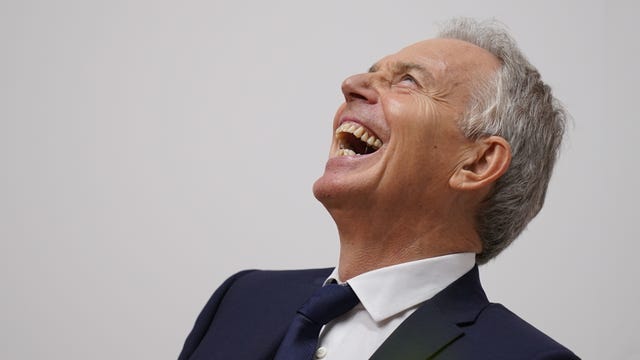
Sir Tony said: “We know the peace isn’t perfect. We know the institutions have often been rocky and unstable as they are today.
“We know there’s still a lot of distrust and mistrust between the communities.
“But we also know that Northern Ireland is a much better place than it was before the Good Friday Agreement.
“And the only thing I would say to today’s leaders is I think when you stand back and you reflect, you know in your heart of hearts, what the right thing to do is, and you should just get on and do it.”
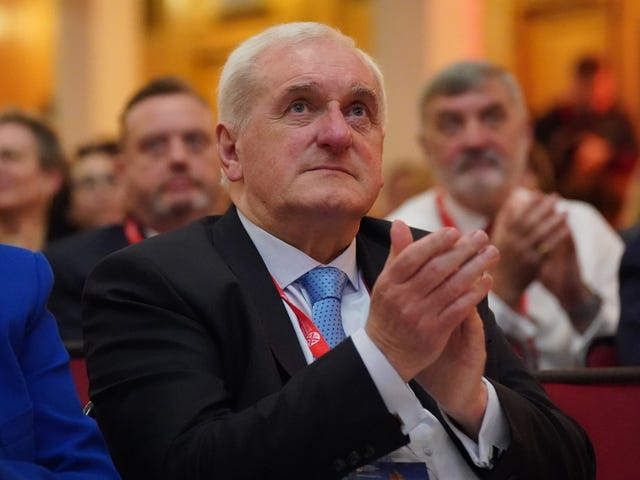
Mr Ahern said the alternatives to the Good Friday Agreement are “not good”.
He added: “So, let’s hope they (the DUP) listen to what George Mitchell said today, and listen to what we’re saying, that we all just get back on the track.
“There’s too many big things to be dealing with than to be arguing about some detail that was caused over something or another, which I’m not sure what it is even.”
He added: “So just let’s move forward and try and make this work.”
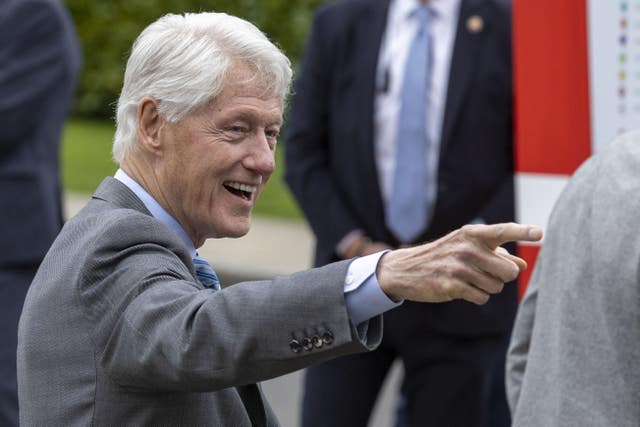
Mr Clinton told the conference that the 1998 peace deal came about because political leaders decided the “time was right to do the right thing”.
He said: “It just happens, nobody’s perfect, you can’t foresee all this, and the fact that we trusted each other and we trusted (George) Mitchell, I think we earned the trust of the parties in Northern Ireland that we were dealing with across the board, because they thought we would be straight with them, and that’s how it happened.
“There were days I felt like I was taking Seamus Heaney’s advice to take a flying leap and walk on air against your better judgment.
“That’s how it started. We all just decided that the time was right to do the right thing.”
Mr Clinton said people thought they were crazy to believe they could get the paramilitary groups to decommission their arms.
“We’d like to tell you that we had it all thought through but the truth is we made up a lot of it as we went along, we had to wing it,” he said.
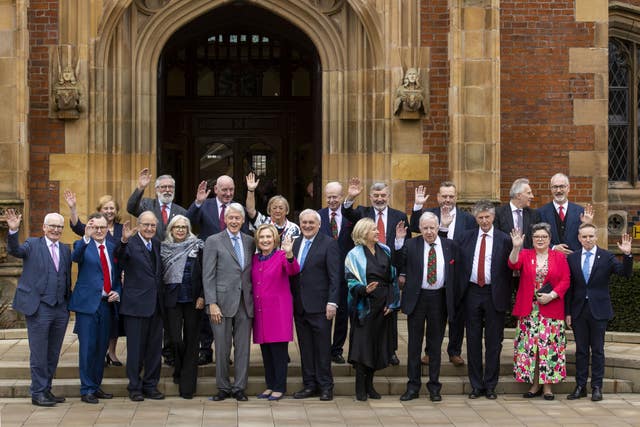
The Good Friday Agreement created powersharing institutions at Stormont that involved nationalists and unionists governing Northern Ireland together in a mandatory coalition arrangement.
While the pact largely ended the Troubles, which had claimed more than 3,600 lives since the late 1960s, it has failed to bring long-term political stability in the region and devolution has collapsed several times in the last two decades.
The anniversary comes amid another period of collapse, with the DUP blocking powersharing in protest at post-Brexit trading arrangements that have created economic barriers between Northern Ireland and Great Britain.
The barriers were first introduced under the Withdrawal Agreement’s contentious Northern Ireland Protocol.
The UK and EU recently agreed the Windsor Framework as a way to cut the red tape created by the protocol.
While the DUP says the framework has gone some way to address its concerns about the protocol, it says significant problems remain.
The party has opposed the framework at Westminster and has made clear its boycott of Stormont will continue until it secures further assurances from the UK Government over its concerns around sovereignty and the application of EU law in Northern Ireland.
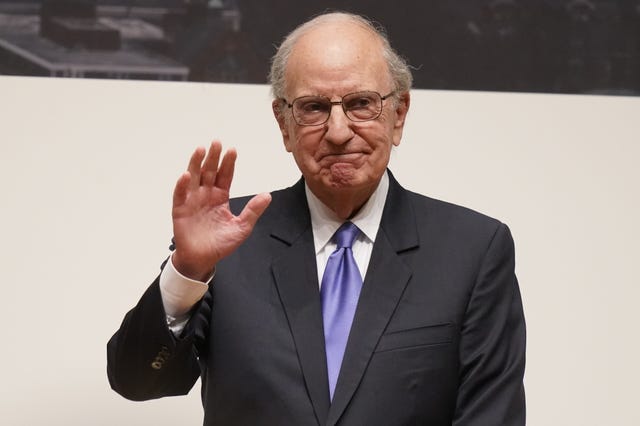
Making the keynote address earlier in the day, former US senator George Mitchell, who chaired the 1998 negotiations, said the people of Northern Ireland and their political leaders “changed history” 25 years ago.
He said: “When you approved the agreement you were also talking to Israelis and Palestinians, to Colombians, to Africans, Asians, to Americans – in fact you were talking to the world.
“This is an agreement for peace and for the future, not just here, but everywhere.”
He added: “We need people who believe, who know that the possible does exist within the impossible – don’t let it slip away.”
A bust in honour of Mr Mitchell was later unveiled in the grounds of the Belfast campus.
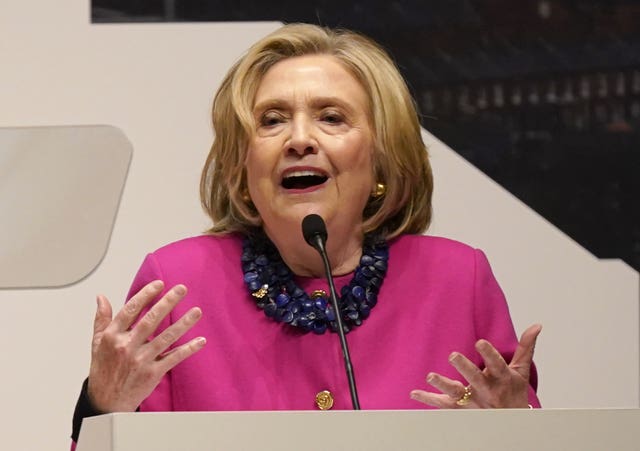
Mrs Clinton said the Windsor Framework on post-Brexit trade provided Northern Ireland with an opportunity to become an economic hub for global trade and investment.
“While the Good Friday Agreement is an enormous achievement, we know that peace, prosperity and progress that so many have worked tirelessly to achieve remains incomplete,” she said.
“The work of integration and housing and schools is far from finished, neighbourhoods remain divided, poverty and unemployment persist, the difficulties of the past continue to threaten the present.
“You know, we are at a standstill with the Northern Ireland Assembly no longer functioning. But the Windsor agreement provides a path forward not just for convening but for positioning Northern Ireland as an economic hub for global trade and investment through privileged access to the UK and all of its trading partners, as well as the EU.”
She added: “There have been many moments in Northern Ireland’s peace journey where progress seemed difficult, when every route forward looked blocked, there seemed nowhere to go.
“But you have always found a way through and I believe you will again, because the stakes for the people of Northern Ireland are so high.
“You stand as an example to the world of how even the staunchest adversaries can overcome differences to work together for the common and greater good.
“So, I encourage everyone now to move forward with the same spirit of unstoppable grit and resolve that brought the peace 25 years ago. Your friends in the United States will be behind you all the way as you work toward peace, prosperity and stability that lasts.”




Comments: Our rules
We want our comments to be a lively and valuable part of our community - a place where readers can debate and engage with the most important local issues. The ability to comment on our stories is a privilege, not a right, however, and that privilege may be withdrawn if it is abused or misused.
Please report any comments that break our rules.
Read the rules hereLast Updated:
Report this comment Cancel